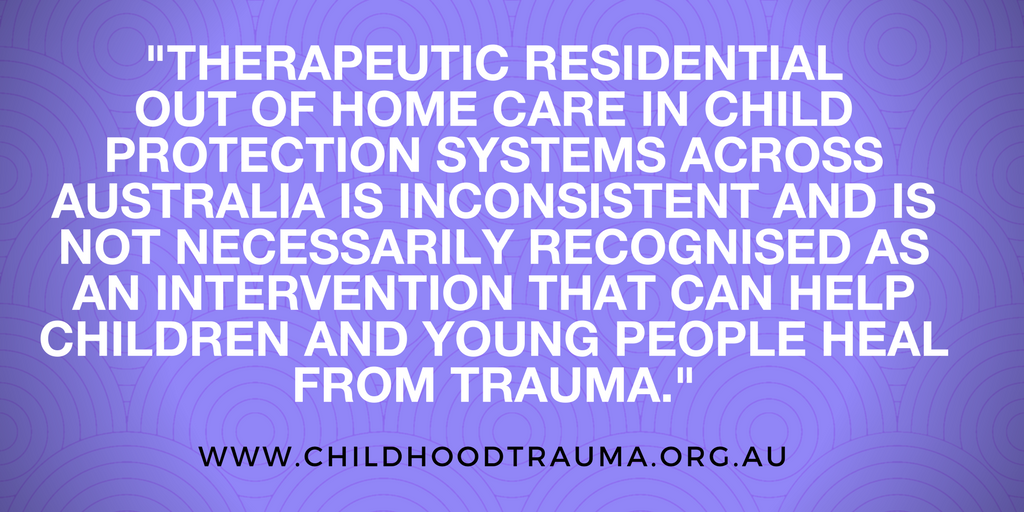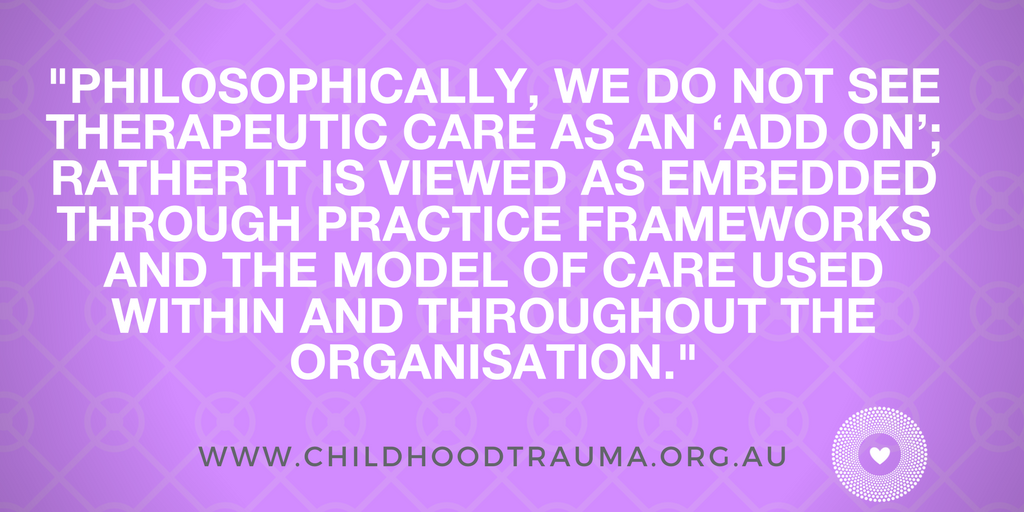
Australia’s National Therapeutic Care Alliance – Part 1
This blog article is authored by Glenys Bristow
at the National Therapeutic Residential Care Alliance.
Matti is 14 and has experienced 68 placements over the last 8 years. Matti learnt very early in his life that adults who are supposed to love and protect you are frequently dangerous, violent and can’t be trusted to keep you safe or meet your needs. He had often been reported to child protection, sometimes being sent home, in other instances being placed in care. As a child, he could not be comforted; he didn’t cry or make noises but constantly rocked backwards and forwards, whimpering softly as he tried to reassure himself. As he got older, Matti started to express his pain by verbally and physically assaulting anyone who tried to get close to him. He had not attended school since he was 9 and many attempts to place him with family and extended family had ended in heartbreak. He needed a home with people who would build a safe, trusting relationship with him over time and ‘hang in there no matter what happened’ – or how hard Matti tried to push them away. He needed a placement that was consistent and loving with clear routines and staff who were strong enough to keep him safe. He was finally referred to therapeutic residential care.
We will follow Matti’s story and his journey through care over the next few blogs. The purpose of these blogs is to:
- Explain our passion and purpose, definitions and underpinning philosophy regarding the formation of the Alliance.
- Further Matti’s story by identifying why we need a research agenda for therapeutic care in Australia
- Explore the complex practice and standards outcomes for Matti. What did workers do to effect change and how did this work?
- What did we actually DO together with Matti? We consider the history of Matti’s journey with us and what we learned from one another.
In summary: Most Australians understand Foster Care and can identify promotional material depicting loving families opening their hearts and homes to children. We are very much aware however, that little is known about residential care in general, and therapeutic residential care specifically, in Australia. We are working hard to develop strategies to promote and raise the profile of the amazing work undertaken in this sector by dedicated, skilled staff working with vulnerable children, young people and their families who need us most.
The National Therapeutic Residential Care Alliance (NTRCA) started in Brisbane in October 2012 when a group of likeminded colleagues working across States and Territories of Australia opened a discussion about the possibilities of working together to share our collective wisdom and knowledge about best practice in therapeutic residential care for high risk young people. We wanted to share collective research and practice knowledge to drive quality service provision to some of the children and young people who need skilled professionals the most. The Alliance is led by a Reference Group of experienced therapeutic residential care practice and policy leaders from each Australian jurisdiction along with researchers who have an established commitment to this area
We recognised that the exploration of TRC models was developing concurrently across Australian States and Territories, presenting us with the opportunity to collaborate, grow and learn together, thus maximizing the resources available to support best practice. At the same time, we recognised the opportunity to lead in this space rather than rely solely on government to support the development of the TRC policy and practice.

In practice, the work of the Alliance is that of a unique group of passionate service providers striving to articulate a ‘common language’ or common voice for therapeutic service providers. We provide a coordinated and collaborative community of practice committed to developing evidence-based practice for therapeutic residential care, whilst understanding and incorporating the different approaches to care in Australia and in international communities.
We recognise that therapeutic residential care in child protection systems across Australia is inconsistent and is not necessarily recognised as an intervention that can help children and young people heal from trauma. We feel we have a very real opportunity to set the agenda for therapeutic residential care in Australia as a legitimate and valued intervention for children and young people in out-of-home care. The following definition is underpinned by considered principles which clearly articulate our philosophy and organisational principles:
Therapeutic residential care is an intensive intervention for children and young people, which, in Australia, is a part of the out of home care system. It is a purposefully constructed living environment which creates a therapeutic milieu that is the basis of positive, safe, healing relationships and experiences designed to address complex needs arising from the impacts of abuse, neglect, adversity and separation from family, community and culture. Therapeutic care is informed by current understandings of trauma, attachment, socialisation and child development theories, which are translated in practice and embedded in the therapeutic care program.

Philosophically, we do not see therapeutic care as an ‘add on’; rather it is viewed as embedded through practice frameworks and the model of care used within and throughout the organization. We believe the following elements are paramount to understanding, building and maintaining therapeutic residential care in Australia. We will present these in more detail at the International Childhood Trauma Conference in July – August 2018 when we plan to launch the NTRCA website and invite broad sector interaction with the Alliance.
In the leadup to this launch, we will weave our philosophy through Matti’s story and then present this in more detail at the conference.
- Our Philosophy
- Values
- Culture
- Program and practice framework
- Congruence
- Professionalism
- Child and young person focused:
- Family inclusive:
- Wellbeing (Agencies, workers, children, young people and their families nd communities)
- Organisation
- Governance
- Policy and procedures
- Training
- Therapeutic specialist
- Managers/Coordinators
- Auditing/licensing
- Funding
Through the Alliance website we will regularly discuss latest developments in this arena with national and international experts. The Alliance is currently developing comprehensive service design elements to inform a set of national standards for the sector; this will include development of standardised audit and evaluation tools tailored specifically to therapeutic residential care in Australia.
Working with researchers, we also hope to contribute to the reputation and esteem in which residential care workers are held and elevate the status of therapeutic residential care beyond that of ‘care and containment ‘and a placement of ‘last resort’.
